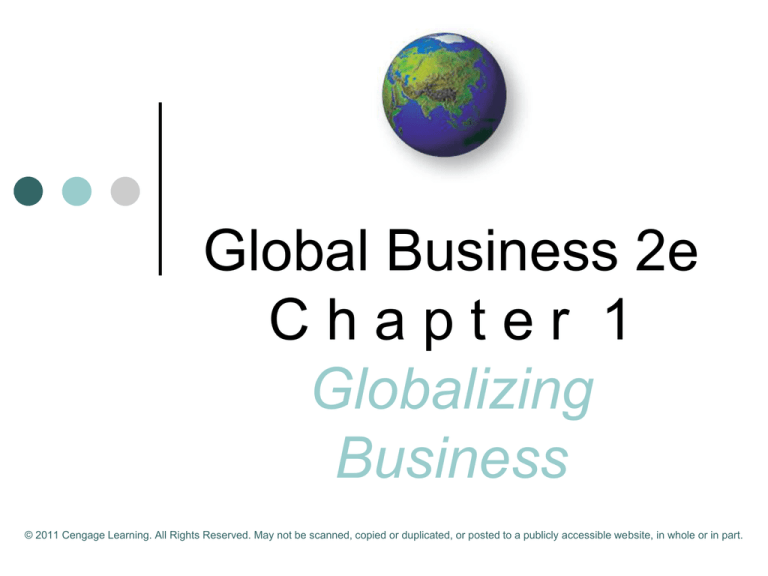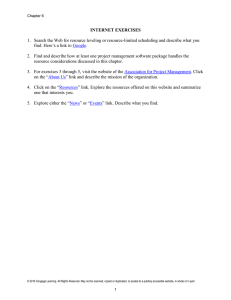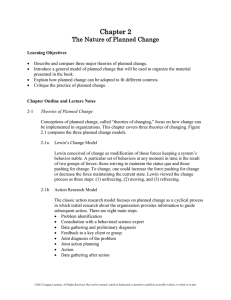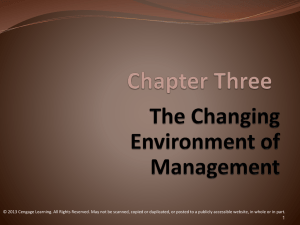
Global Business 2e
Chapter 1
Globalizing
Business
© 2011 Cengage Learning. All Rights Reserved. May not be scanned, copied or duplicated, or posted to a publicly accessible website, in whole or in part.
LEARNING OBJECTIVES
After studying this chapter, you should be able to:
1.
Explain the concepts of international business and global
business
2.
Give three reasons why it is important to study global
business
3.
Articulate one most fundamental question and two core
perspectives in the study of global business
4.
Identify three ways of understanding what globalization is
5.
State the size of the global economy and its broad trends and
understand your likely bias in the globalization debate
© 2011 Cengage Learning. All Rights Reserved. May not be scanned, copied or duplicated, or posted to a publicly accessible website, in whole or in part.
WHAT IS GLOBAL
BUSINESS?
international business
business (firm) that engages in international (crossborder) economic activities or the action of doing
business abroad
global business
business around the globe including both
international (cross-border) activities and domestic
business activities
© 2011 Cengage Learning. All Rights Reserved. May not be scanned, copied or duplicated, or posted to a publicly accessible website, in whole or in part.
FIRMS IN GLOBAL
BUSINESS
multinational enterprise (MNE)
firm that engages in foreign direct investments
foreign direct investment (FDI)
investments in, controlling, and managing valueadded activities in other countries
Note that global business also addresses domestic
firms competing and/or collaborating with foreign
entrants
© 2011 Cengage Learning. All Rights Reserved. May not be scanned, copied or duplicated, or posted to a publicly accessible website, in whole or in part.
THE IMPORTANCE OF
EMERGING ECONOMIES IN
GLOBAL BUSINESS
Global business is not limited to firms competing in
developed economies
emerging economies (emerging markets)
a term that has gradually replaced the term
“developing countries” since the 1990s
? Can you name three or four emerging
economies?
© 2011 Cengage Learning. All Rights Reserved. May not be scanned, copied or duplicated, or posted to a publicly accessible website, in whole or in part.
IMPORTANT ECONOMIC TERMS
gross national product (GNP) - measured as the
sum of value added by resident firms, households, and
government operating in an economy
gross domestic product (GDP) - total market value
of all final goods and services produced within a country in
a given period of time usually a calendar year
gross national income (GNI) - GDP plus income
from nonresident sources abroad – the term used by the
World Bank and other international organizations to
supersede the GNP term
purchasing power parity (ppp) - adjustment made
to the GDP to reflect differences in the cost of living
© 2011 Cengage Learning. All Rights Reserved. May not be scanned, copied or duplicated, or posted to a publicly accessible website, in whole or in part.
EMERGING ECONOMIES
KEY TERMS
Triad – North America, Western Europe and
Japan
BRIC – acronym for the emerging economies of
Brazil, Russia, India, and China
Group of 20 – leaders of 19 major countries + EU
who meet on biannual basis to discuss global
economic issues
© 2011 Cengage Learning. All Rights Reserved. May not be scanned, copied or duplicated, or posted to a publicly accessible website, in whole or in part.
© 2011 Cengage Learning. All Rights Reserved. May not be scanned, copied or duplicated, or posted to a publicly accessible website, in whole or in part.
VIEWING THE GLOBAL
ECONOMY
base of the pyramid - vast majority of
humanity, about four billion people, live at the base
of the pyramid and make less than $2,000 a year
The “Bottom Billion” – concentrated in Africa
and Central Asia – 58 small countries, stuck at the
bottom in terms of growth, incomes, and human
development
© 2011 Cengage Learning. All Rights Reserved. May not be scanned, copied or duplicated, or posted to a publicly accessible website, in whole or in part.
© 2011 Cengage Learning. All Rights Reserved. May not be scanned, copied or duplicated, or posted to a publicly accessible website, in whole or in part.
© 2011 Cengage Learning. All Rights Reserved. May not be scanned, copied or duplicated, or posted to a publicly accessible website, in whole or in part.
? What do you hope to gain from taking this course
and studying global business?
© 2011 Cengage Learning. All Rights Reserved. May not be scanned, copied or duplicated, or posted to a publicly accessible website, in whole or in part.
WORKING IN A GLOBAL FIRM
expatriate manager
a manager who works abroad, or “expat”
international premium
significant compensation “package” when
working overseas
? What are some of the benefits you might enjoy
as an expatriate manager?
© 2011 Cengage Learning. All Rights Reserved. May not be scanned, copied or duplicated, or posted to a publicly accessible website, in whole or in part.
This unified framework will carry through the entire
book as you study global business.
© 2011 Cengage Learning. All Rights Reserved. May not be scanned, copied or duplicated, or posted to a publicly accessible website, in whole or in part.
FIRST CORE PERSPECTIVE:
AN INSTITUTION-BASED VIEW
An institution-based view suggests that the
success and failure of firms are constrained by
institutions
formal rules - requirements that treat domestic
and foreign firms as equals enhance the potential
odds for foreign firms’ success or those that
discriminate against foreign firms, would
undermine the chances for foreign entrants
informal rules - cultures, ethics, and norms
play an important part in shaping the success and
failure of firms around the globe
© 2011 Cengage Learning. All Rights Reserved. May not be scanned, copied or duplicated, or posted to a publicly accessible website, in whole or in part.
SECOND CORE
PERSPECTIVE:
A RESOURCE-BASED VIEW
A resource-based view suggests that the success
and failure of firms are determined by their
environments
liability of foreignness - inherent
disadvantage that foreign firms
experience in host countries because of
their nonnative status
© 2011 Cengage Learning. All Rights Reserved. May not be scanned, copied or duplicated, or posted to a publicly accessible website, in whole or in part.
WHAT IS GLOBALIZATION?
globalization
close economic integration of countries and
peoples of the worlds
semiglobalization
strategy that suggests that barriers to market
integration at borders are high but not high
enough to completely insulate countries from each
other
© 2011 Cengage Learning. All Rights Reserved. May not be scanned, copied or duplicated, or posted to a publicly accessible website, in whole or in part.
THREE VIEWS OF
GLOBALIZATION
A new force in recent times
A long-running historical evolution
A pendulum swinging between
extremes
© 2011 Cengage Learning. All Rights Reserved. May not be scanned, copied or duplicated, or posted to a publicly accessible website, in whole or in part.
LESSONS FROM A
RECESSION
risk management
the identification and assessment of risks and the preparation
to minimize the impact of high-risk, unfortunate events
scenario planning
a technique to prepare and plan for multiple scenarios (either
high or low risk).
© 2011 Cengage Learning. All Rights Reserved. May not be scanned, copied or duplicated, or posted to a publicly accessible website, in whole or in part.
© 2011 Cengage Learning. All Rights Reserved. May not be scanned, copied or duplicated, or posted to a publicly accessible website, in whole or in part.
© 2011 Cengage Learning. All Rights Reserved. May not be scanned, copied or duplicated, or posted to a publicly accessible website, in whole or in part.
© 2011 Cengage Learning. All Rights Reserved. May not be scanned, copied or duplicated, or posted to a publicly accessible website, in whole or in part.
NONGOVERNMENT
ORGANIZATIONS (NGOS)
nongovernment organizations (NGOs)
heterogeneous organizations with numerous
classifications:
advocacy - environmentalists, human rights activists,
consumers, etc. that raise awareness, acceptance
and knowledge by lobbying, press work and activist
events
operational - design and implementation of
development-related projects that may stress service
delivery or participation; whether religious or secular;
whether more public or private-oriented - can be
community-based, national or international
© 2011 Cengage Learning. All Rights Reserved. May not be scanned, copied or duplicated, or posted to a publicly accessible website, in whole or in part.








